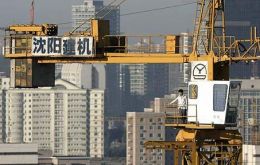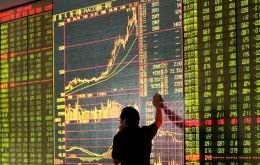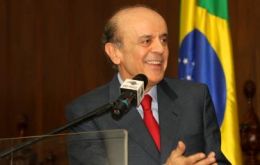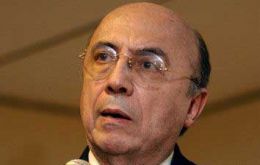MercoPress. South Atlantic News Agency
Tag: Yuan
-
Friday, June 18th 2010 - 19:28 UTC
World Bank calls for stronger Yuan to reduce inflation and spur domestic demand

World Bank has reiterated its view that the Chinese government should allow the Yuan to strengthen against other international currencies. The bank also forecasted the Chinese economy would grow 9.5% in 2010 and 8.5% in 2011.
-
Wednesday, May 12th 2010 - 07:16 UTC
China April Inflation Accelerates and Property Prices Jump 12.8%

April inflation in China has accelerated as bank lending exceeded estimates and property prices jumped by a record, increasing pressure on the government to raise interest rates and let the currency appreciate.
-
Wednesday, May 5th 2010 - 06:14 UTC
China’s Tightens Credit, Pushes Stock Markets to their Lowest in Seven Months

China's stocks fell on Tuesday sending the benchmark index to the lowest in seven months, on concern ordering banks to set aside more reserves won't be enough to avert asset bubbles in the world's third-largest economy.
-
Tuesday, April 27th 2010 - 06:08 UTC
Brazil will Impose Import Levies to Face “Cheap” US Dollar, Unless Accord is Reached

Brazil’s government may take additional steps to limit gains in the local currency Real should advanced economies favor policies that keep their currencies weak, Finance Minister Guido Mantega said.
-
Monday, April 26th 2010 - 01:10 UTC
Serra Calls for a More “Flexible” Mercosur; Claims it Limits Brazil’s “Sovereignty”

Brazilian opposition presidential candidate Jose Serra—who leads in public opinion vote intention polls—reiterated his call for a more “flexible” Mercosur, effectively becoming a free trade area, because the current format limits Brazil’s sovereignty to sign agreements with other non member countries.
-
Saturday, April 24th 2010 - 11:08 UTC
Exchange Rate Disorder

By Jose Antonio Ocampo – Two troubling features of the ongoing economic recovery are the depressed nature of world trade and the early revival of international global payment imbalances. Estimates by the International Monetary Fund and the United Nations indicate that the volume of international trade in 2010 will still be 7% to 8% below its 2008 peak, while many or most countries, including industrial nations, are seeking to boost their current accounts.
-
Wednesday, April 21st 2010 - 02:52 UTC
Stronger Yuan “critical” for a more stable world economy claims Brazil

A stronger Chinese currency is “critical” for the good of the global economy, Brazil's central bank chief Henrique Meirelles said on Tuesday, joining a chorus of critics of China's foreign exchange policy.
